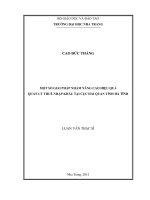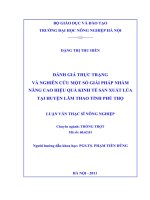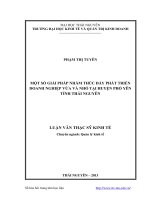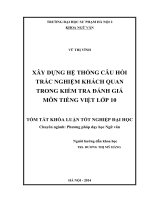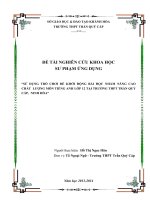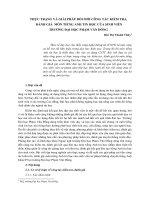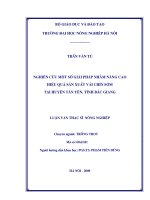Một số giải pháp nhằm kiểm tra, đánh giá môn tiếng anh lớp 10 tại trường THPT DTNT tỉnh
Bạn đang xem bản rút gọn của tài liệu. Xem và tải ngay bản đầy đủ của tài liệu tại đây (376 KB, 22 trang )
TABLE OF CONTENTS
Pages
PART I: INTRODUCTION
1. Rationale for topic choice
1
2
2. Aims of study
3
3. Methodology
4
4. Scope of the study
PART B: SOLVING THE PROBLEM
4
3
1. Rationale
3
1.1. The concept of testing and asessment
3
1.2. Classification
4
1.3. Criteria for assessment
4
1.4. The aim, meaning and role of assessment
5
1.5. Assessment procedure
6
2. Reality
6
3. Solutions for implimentation
7
4. Demonstration
12
5. Findings
PART C: CONCLUSION AND RECOMMENDATION
15
19
I. Conclusion
19
II. Recommendation
19
1. To teachers
19
2.To educational managers
20
PART I: INTRODUCTION
1
1. Rationale for topic choice
Assessment plays an essential role in teaching activities. However, the
effectiveness of assessment varies significantly with its methods.
Assessment is a step quantifying the result of any specific activity, including a
teaching session, results of a semester, a school year, a education level, a module or
students' overall performance. Assessment is meaningful for not only learners but
also teachers, educators and related parties. It enables teachers to recognize the
strength and weakness of their teaching.It also help learners to evaluate the
knowledge gained through grading, which is a high-stake form of assessment because
it may influence their further education, graduation or even life choice.Therefore,
assessment is an indispensable part of teaching and improving teaching quality.
Assessment necessarily and nearly compulsorily involves three criteria: impartiality,
objectivity and... in order to turn it into an precise and effective evaluation tool for
teaching, improving social equality and motivating learners. Otherwise, imprecise
assessment might create inequality and demotivate learners. Moreover, the basis of
assessment, despite various available elaboration, ultimately takes root in 4 main
aims of learning: learning to know, learning to do, learning to actualize oneself,
learning to integrate socially. Thus, precise assessment is only feasible to some extent
because its target is intangible thoughts and knowledge, which can only be
communicated and qualified via verbal or written language.
Innovation in formal education is the process of innovating aims, contents,
methods, facilities, assessment as well as concepts, methodology and management in
course design, among which assessment innovation is a significant tool to determine
the capability of learners, adjust the process of teaching and learning. motivate
changes in pedagogy and contribute to progress in human education.
Assessment in high school education has been underestimated due to many
reasons. Teachers mainly focus on evaluating within the scope of knowledge and skill
attainment, ignoring the requirements to perform tasks similar to real life situation in
order to evaluate the level of skills.Educators usually recommend that the importance
of education in high school is teaching study skills. Thus, the broadening of
assessment scope should be considered when content and format of assessment are
chosen. The principle 'teacher assessment should motivate students' self-assessment
and measure the precision, objectivity of learning results and the extent to which
teaching aims are achieved' should also be ensured.[
Assessment in high school strongly requires innovative changes in Vietnam
education system and Thanh Hoa ethnic boarding high school is not an exception.
From the objective and subjective reasons mentioned above, the subject of my study
2
is "Measures to innovate assessment of English in grade 10 of Thanh Hoa Ethnic
boarding high school".
2. Aims of study
The study aims to find a practical, precise and impartial method od assessment
which helps improve students' confidence, motivation and creativity; helps teachers
adjust pedagogy and education management.
3. Methodology
3.1. Theoretical methods
Theories about assessment of English language teaching
3.2. Empirical methods
Pedagogical practice, comparison methods
4. Scope of the study
4.1. Subject of the study
The process of assessing learners in grade 10 D of Thanh Hoa ethnic boarding high
school in academic year 2016-2017
4.2. Object of the study
Techniques to assess English language teaching for grade 10.
3
PART B. SOLVING THE PROBLEM
1. Rationale
1.1. The concept of testing and assessment .
1.1.1 Testing
According to Vietnamese dictionary by Hoang Phe, , the test term is defined as
"Inspection is a review of the actual situation for evaluation and comment"[3].
Testing is investigation, consideration and review of a task or reality for commenting,
appreciation and review . Overall, scientists and educators unanimously agree that
testing means collecting data, evidence to investigate reality in order to evaluate and
comment. In education, there are various types of assessment, namely formative
assessment (daily assessment), periodic assessment (at the end of chapters, sections)
and summative assessment (end of term assessment).
1.1.2. Assessment
Assessment is the process of forming appraisal and judgement of the results of
a task based on the analysis of data in comparison with a set of aims and standard in
order to make suitable decision in improving reality, advancing quality and
effectiveness of that task.
The concept of assessment used in the field of education is understood in
different ways. According to C.E. Beeby (1997) "Evaluation is the systematic
collection and interpretation of evidence that leads to judgment of value from the
point of view of action,"[1] which emphasizes value. Owen & Rogers (1999)[6]
"Evaluating is a systematic gathering of information and making judgments based on
information obtained." Thus, the concept of assessment is considered in accordance
with the purpose and specific object to be assessed. It is understandable that the
evaluation is a systematic collection of information about the state of the object being
assessed, thereby providing accurate statements based on the information obtained as
the basis for the subject matter. Introduce measures to improve the quality of
education.
To sum up, assessment is the activity of concluding the judgement and
evaluation of students' level. It initially involves the examination of students' work,
then the measurement to collect necessary data and finally a conclusion. Thus, testing
and assessment are two closely related processes. Testing is to provide information
for assessment and assessment is based on the result of testing. They can be
combined into a unified process called testing-assessment.
1.2. Classification of assessment
- The concept of testing in part 1.1.1 , author is based on reference [3]
- The concept of assessment in part 1.1.2, author is based on reference [1] and [6].
4
Having decided on the test format, teachers can choose suitable exercises to
test students' skills and linguistic knowledge. The type of exercise used in testing
include:
1.2.1. Placement tests
This concept does not involve the content or format of the test but only focuses
on the aim of testing. Therefore, various formats and processes can be chosen
depending on the course aims. Tests for a linguistic course usually consist of
interviews and paper tests. A paper tests can combine both multiple choice and essays
or separate these two types.
1.2.2 Diagnostic tests
They are testing at the implementation of a course in order to predictably
supplement insufficient or weak knowledge and to determine the real current level of
students, aiming to adjust a course design in accordance with the original aims.
1.2.3. Progress tests
They are testing after the beginning of a course, in other words, periodic tests
in the middle of a course or on the request of the managers or students. The content of
the test is also in the lesson. Progess tests are different from achievement tests in the
limitation of aims and content. This type of testing is usually designed by teachers
and can only evaluate the teacher's achievement in teaching and recognize the
strength and weakness of learners.
1.2.4. Achievement tests
This type of testing is usually used at the end of a course, and may be to award
a certificate. They are relatively similar to progress tests because the only difference
is in time. The basic aim of this type of testing is to evaluate the results students have
achieved after a course or a program.
1.2.5. Proficiency tests
They measure the level of proficiency independently from learning or teaching
program. Proficiency tests assess based on specific aims, such as to meet a required
language proficiency level to further education.
1.3. Criteria for assessment
Assessment should ensure comprehensiveness (knowledge, skills, ability,
attitudes and behaviors of students), reliability (precision and objectivity), feasibility
(content, format and facilities) and classification requirement [2]. It involves 3 levels,
namely recognition, understanding and application (low and high level). Specifically,
the range of classification should be as broad as possible and should be highly
- Criteria for assessment in part 1.3, author based on reference [2].
5
effective (it could evaluate all necessary aspects and have positive influence on the
teaching process).
1.4. The aim, meaning and role of assessment
1.4.1. The aim of assessment
To publicize the evaluation of an individual student and a class's capability and
result in order to create opportunities for them to develop self-assessment skill,
recognize personal progress and motivate learning.
To aid teachers in recognizing their own strength and weakness, improving
pedagogy, striving for teaching quality and effectiveness advancement.
1.4.2. Meaning of assessment
Assessment is significantly important to students, teachers and especially educational
management.
- To students: Systematic and continuous assessment provide 'backward information',
which enables students to adjust learning activities. It shows students the extent to
which they have absorbed knowledge and their limitation. It also develops cognitive
skills through mental activities such as memorizing, recalling, precision, generalizing,
systematizing knowledge. These activities give students opportunities to develop
creativity and flexibility to apply knowledge into real life situations.Besides, they
give students a sense of responsibilities and discipline, a will for better achievements
and belief in their potential. Moreover, assessment partly remedy students' ignorance
and arrogance. [5]
- To teachers: To provide 'outside backward information', which may contribute to
pedagogical adjustment.
- To educational management: To provide information on teaching and learning
reality in an educational education so that timely policy can be used to ensure
conformity, encourage creative ideas and to guarantee that educational aims are met.
1.4.3. The role of assessment in education
The content and approach of teaching are equally important in current
educational system. Innovation in educational method is an urgent need to improve
teaching quality. Innovation in teaching requires simultaneous changes from teaching,
learning materials, teaching methods to assessment. Assessment plays noticeable role
in advancing educational quality. The results of assessment is the basis for adjustment
in teaching, learning as well as management. In contrast, if assessment is misleading,
it will possibly results in inaccurate perception of educational quality and
considerable negative impact on human resource use. Therefore, innovation in
assessment is urgently necessary in education as well as society. Reasonable,
- The meaning of assessment to students in part 1.4.2, author based on reference [5].
6
impartial and precise assessment will help improve learners' self-confidence,
enthusiasm and creativity in study.
1.5. Assessment procedure
Assessment in education is a complicated and challenging issue because it is holistic
and multi-faceted. Thus, in order to assess a student, a class, a cohort accurately, the
first step is to build a procedure, choose a method and to collect necessary data. This
procedure may involve 4 stages: measure, quantify, evaluate and decide.
Measure: Record test result in nummerical marks, which are symbols indirectly
reflecting students' level qualitatively though not necessarily quantitatively.
Quantify: Use data to make quantitative calculation on knowledge and skills of
students. This is a transitional step between measurement and evaluation.
Quantification can be based on standards or criteria.
Evaluate: This step requires teachers to make jugement on the reality of a student's
level in the tested topic sp as to come up with measures to remedy weakness or to
promote effectiveness
Decide: This is the final step in assessment, teachers will inform students of specific
measures for students' improvement.
2. Reality.
According to Professor. Dr. Nguyen Cong Khanh [4], the weakest of the
assessment of our secondary eduacation is based on unsuitable purposes, which
makes the educational process lacks developments. The implementation of current
assessment procedure in Vietnam only focus on summative purpose, which concludes
on students' capabilities, but neglects formative purpose. In other words, it is testoriented (towards high school graduation and university entrance exam). Nearly all
activities of teachers and students revolve around improving test results by, for
instance, learning sample essays by heart, practice solutions to typical exercises in
exams. All effort of the school management only serves as a preparation for a
summative conclusion and students do not receive any support to get better . When it
is highly unlikely that they are going to make any achievement, some student may
choose cheating.
In addition, assessment is inadequate in methods, which makes education
impractical.The popular methods of assessment in current high school education
system, especially in senior high school, are only limited to paper tests. They consist
of two familiar parts: written tasks and multiple choice, both of which are only
suitable to prove the attainment of theoretical knowledge.
- The reality in part 2, author is based on reference [4]
7
Another weak point of assessment is rigid thus does not encourage initiative
and creativity of students in learning. The current assessment regime does not allow
students to have personal choice in proving their potential and it may limit students'
initiative and creativity. The methods of assessment only emphasizing recollection of
academic knowledge do not enable students to show the knowledge and capability
they have gained outside the classroom. Moreover, those knowledge and skills may
worsen their performance if they are different from the specified answers in
mechanical tests. On the other hand, numerical test results will be useless if highscoring students do not have opportunities to share the experience and strategies for
success with others to learn from. As a consequence, students lose their initiative,
creativity and problem solving skills. In contrast, the innovative assessment methods
utilize assessment as opportunities for students and interaction and students' peerinteraction. Those problems are faced by teachers and students at Thanh Hoa ethnic
boarding high school. How to innovate assessment of English there? Here are some
solutions to solve these problems.
3. Solutions for implementation
As teachers are chiefly responsible for student assessment, they should pay
attention to the following changes in order to enhance the precision of assessment.
Solution 1: Innovation in timing for assessment
Assessment should not be made by the end of a semester or academic year but
during the whole learning process instead. Assessment should be carried out
immediately after each teaching session and the next assessment should be more
demanding but with a different format from the previous one
Solution 2: Innovation in using assessment results
Most school management only use test results to classify students' academic
level and to nominate awards. Nonetheless, these results can provide important and
precise information about students' learning as well as teachers' teaching progress in
English language subject for the school management, and regulatory authorities.
These information is the basis for timely and effective decision, which may improve
the teaching and learning of English language subject.
Solution 3: Innovation in aims of assessment
Teacher heavily rely on the end-of-academic year results, which means that
final tests is extremely important to both teachers and students. However, while
teachers stressed summative aim of 'final exams', its formative purpose of
'encouraging learning' may play second fiddle despite the fact that the second purpose
is an essential part of assessment. It directly influence and encourage students to
8
improve their knowledge and learning process. In addition, although induction tests
are always arranged, teachers occasionally pay attention to these tests, which may
help teachers classify students to choose suitable teaching methods. In conclusion,
teachers should focus on formative assessment so as to evaluate students' capabilities
holistically.
Solution 4: Innovation in assessment content
Teachers should not emphasize mechanical recollection of theoretical
knowledge and should pay more attention to understanding and application into
practice instead. Tests should cover all learning content, knowledge, skills as well as
level, which help classify students. Tests should be compatible with standard
schedule, knowledge and skill. They should also be suitable for students' level.
Teachers must pay equal attention to all four skills (listening, speaking,
reading, writing) for three following reasons: first, to precisely evaluate students
(recognize the right level, students think results are fair, evaluate students from low to
high level, evaluate impartially, tests are sparsely spaced in order not to discourage
weak students but to create learning habit which avoids being arrogant, negligent,
prepare lessons before class.
Teachers must test knowledge and skills in combination such as readingwriting, grammar-vocabulary, listening-speaking in different kind of tests.
Solution 5: Forms of assessment
In addition to using different teaching methods ( teachers pay equal attention to
students, design varying types of exercises for students of different levels so that
teachers can classify and aid weak students while encourage good students), teachers
should use self-assessment method which help students evaluate themselves and
further their strengths or improve their weaknesses. In English language subject in
high school, the forms of assessment consists of oral tests, 15-minute tests and 45minute tests.
• Oral tests.
Teachers should omit oral tests at the beginning of a session but testing
previous knowledge while teaching new lessons. As the results, teachers will have
more time to teach new lessons thoroughly and can still test students. Moreover,
teachers can tests speaking skill of many pairs of students.
* Tests at the beginning of a session: teachers deliver an exercise, call a student to
do in on the board and the rest of the class do it on their notebooks. Then, teachers
can collect some students' answer to mark. Finally, the whole class can make
comments on the exercise written on the board. Alternatively, teachers can call 4
9
students at once to do the same exercise. Any of them can answer if ready, the others
make contribution or answer additional questions.
Example: Checking vocabulary of Lesson: Reading of Unit 12. Teacher's request:
'Write a word in English that means : “trang nghiêm ” Student 1: write the word,
Student 2: determine its part of speech, Student 3: write synonym, Student 4: Write
antonym
This method may reduce students' reticence to speak in oral tests and have
more choices. Teachers can also check pronunciation by distributing handouts which
contains some words and require students to choose words whose underlined parts
are different form those within the same groups.
Another way, which is commonly used in Language Focus lesson, is to
combine checking practice exercise done on the board and homework done on
students' notebooks. If teachers want to check different structures at the same time for
several students, teachers need to limit them to a few groups of grammatical
structures and check several structures at once through written answers while teachers
requires the specific groups of grammatical structures within a specified time. Then
teachers collect and correct students' answers.
* Tests during new lessons:
Teachers ask students to do written exercises during discussion on a new lesson
and do cross checking. Teachers collect students' answers to mark and evaluate
students' learning. Alternative, teachers ask deductive question for students to
volunteer to answer, through which teachers can give comment and marks.
For example: In unit 12-writing a profile, teachers may divide students into groups to
write the profiles based on the given information. Students write and then correct
other groups' writing. Teachers check both students' writing and comment.
1. born on February 28th 1939 / Huế
2. write more than 990 songs: Diêm Xưa, Nối vòng tay lớn.
3. died in HCM city / April 1st 2001
1. born in 1975 in Hanoi.
2. graduate from Hanoi Conservatory / 1977
3.
received many prizes: the first prize in Hanoi’s Singing
Competition, the Golden Voice of Asian / 1998
4. famous albums: Made in VietNam, Chat with Mozart.
10
* Tests through other activities: Test through homework such as making relia
(making mind maps, tables and charts about Conditionals)
Or to prepare a revision, an exercise about a specific topic, to take part in an
extracurricular activity. Take the following test for example: students are required to
work in groups to collect materials about HISTORICAL PLACES (English 10- Unit
16- speaking) then discuss with other students and write a report, the report will be
presented in groups. All groups will discuss an evaluate each presentation in
numerical marks or in comments. Students work is groups and the product is group
work instead of individual work. Students are implementors as well as evaluators.
Or through revision at the end of each lesson: for example: summarize a
listening exercise based on the previous tasks ( English 10 – Unit 12 – Listening)
Or via role-play during a session. For example, in lesson speaking- Unit 12.
Teachers ask students to practice in pairs, playing the role of a reporter and a viewer
on the topic: the most favourite film of the year 2012. This method of testing will
help students understand the lesson thoroughly and enhance students' initiative,
enthusiasm and creativity.
11
• Innovation in 15-minute testing
Teachers deliver 15-minute tests about previous lessons in order to help
students review and apply them. The format of tests could be completely written or
multiple choice or partially written and multiple choice. The scope the the test should
cover an application ideas (for 1 or 2 points out of 10) to check students' application
capabilities because this type of exercise is similar to previous exercise. Teachers
deliver 15-minute tests on : listening-speaking, reading-writing, grammar-vocabulary
skills.
• Innovation in 45-minute testing
In order to encourage students' initiative, assessment should not be limited to
recollection of knowledge or repetition of skills but it should encourage intelligence,
creativity, flexible application of academic knowledge to solve practical problems.
Teachers can deliver 45-minute tests after each session on several previous lessons.
The scope of the test should be based on the contrastive matrix discusses by the
English department. The questions should be compatible with the requirement:
recognize, understand,low-level application, high-level application, Knowledge and
skills should be based on standards regulated by the Ministry of Education and be
suitable to students. The format of this type of tests consists of multiple choice (for
broader scope of testing) and written tests (for language use).
The following table compares the strength and weakness of both formats.
Multiple choice
Written test
1. The tests contain many questions,
which can test knowledge and skills
systematically and holistically.
2. They cover a broad scope within a
short period of time.
3.Teachers can correct them quickly,
precisely and impartially.
4. They enable students to evaluate
their study precisely.
5. Teachers can classify students based
on the broad spectrum of test results.
Weakness
1. The tests consist of only a few
questions, which cover only a part
of students’ knowledge and skills.
2. It is time-consuming to cover a
broad range of subjects.
3. It is time-consuming to mark the
tests and the tests results are less
precise.
4. It is difficult for students to
assess themselves.
5. As the spectrum of results is
narrow, it is difficult to classify
students.
Strength
6. Modern technology can be utilized
in marking and analyzing results.
12
Weakness
Strength
1. It is difficult to evaluate students’
language use.
2. They do not contribute to improving
students’ ability to express and
structure ideas.
3. Limit students thoughts, which may
reduce students’ creativity.
1. They enable teachers to evaluate
students’ language use.
2. They contribute to improving
students’ ability to express and
structure ideas.
3. They create opportunities for
students’ creativity.
4. It is difficult and time-consuming to
design them.
4. It is not difficult or timeconsuming to design them.
It is noticeable that the strength of multiple choice tests is the weakness of
written tests. Therefore, teachers should combines these two formats suitably. Besides
tests which combines both multiple choice and written tests, assessment should not
only focus on numerical marks but also comments. Teachers should write comments
which point out students' strength and weakness of students and encourage selfassessment, which enable students to adjust study styles themselves. Assessment
could also be done by individuals, groups, teachers and classmates. The information
in assessment should be in marking, teacher-student talks, peer talks during not only
class but also in competitions, seminars and extracurricular activities.
4. Demonstration. [7]
4.1. Examples of fifteen minute test
Example 1: Listening fifteen minute test:
Listen to the passage then decide whether the statements are true (T) or false (F) .
T F ....1. The Beatles were the most famous pop group in the world.
T F ...2. They were four boys from the north of England and all of knew much about
music
T F ... 3. They did not have long career.
T F ... 4. Their fist hit record was in 1953.
Listen again then answer the following statements
5. How did The Beatles change the pop music?
_______________________
6. Who wrote the songs they sang?
_______________________
7. When did they split up?
_______________________
8. What was their first hit record in 1964?
_______________________
- Demonstration in part 4, author is based on reference [7]
13
Example 2: Vocabulary and grammar fifteen minute test:
I. PRONUNCIATION: Circle the word that has the underlined part pronounced
different from the other three.
1. a. famous
b. flourish
c. honour
d. behaviour
2. a. citadel
b. brilliant
c. architecture
d. site
II. VOCABULARY AND EXPRESSION: Choose the word or phrase that best
completes the sentence or substitutes for the underlined word.
1. Temple of Literature is a the famous historical and cultural..... in Ha Noi.
a. temple
b. remain
c. ground
d. site
2. All the pillars of the old house were carved with ornamental designs.
a. written
b. engraved
c. painted
d. decorated
3. Van Mieu was a place to.............the most brilliant scholars of the nation.
a. remember
b. memorialize
c. certify
d. impress'
4. Few businesses are flourishing in the present economic climate.
a. growing well
b. setting up
c. closing down d. taking off
5. Hue Imperial City was certified as a World Cultural................. in 1993.
a. History
b. Tradition
c. Heritage
d. Site
III. GRAMMAR AND STRUCTURE
A. Choose the word or phrase - b, c, or d - that best completes sentence.
1.John's grades are really bad.' `Yes, but Tim's are.............
a. worse
b. worst
c. badder
d. so worse
2. 'How was the exam?' 'Well, it was quite easy.................. we expected.
a. more easy that
b. more easy than c. easier than
d. easier
3. 'Mark walks so fast." Well. I think the faster he walks, ………………
a. more tired he gets.
b. the more tired he gets
c. he gets more tired
d. he gets tired
B. Identify the one underlined word or phrase - A, B, C or D - that must be
changed for the sentence to be correct.
1. The northern part of the United States generally (A) receives much(B) more (C)
snow as (D) the southern part.
14
2. You did much(A) more(B) better(C) in the last test than(D) in this one.
Example 3: Reading and writing fifteen minute test
1. Read the passage, then choose the correct answer.
Cu Chi. is located at the threshold of Sai Gon and adjacent to the revolutionary base.
Cu Chi played an important role in the two wars of resistance against the old and new
colonial powers. Cu Chi was an 'underground village' with its tunnels having a
combined length of more than 200km. The main tunnel is 60 – 70 cm wide and 80 90 cm high. Above the tunnel is a layer of earth about 3m - 4m thick, enough to
sustain the weight of 50-ton tanks or heavy artillery as well as the destruction of
bomb up to 100kg. Those who had set foot in that tunnel network. should greatly
admire the talent, determination and endurance of the communist guerillas. The soil
in Cu Chi. was as hard as stone, but with such rudimentary handtools as hoes and
shovels, they had dug and removed tens thousands of tons of earth and stone, and
camouflaged the openings so well that nobody could find them. Many people have
called it a wonder of the 20th century.
1. Where is Cu Chi situated?
a. At the entrance to Sai Gon.
b. In Sai Gon.
c. On the way to a revolutionary base.
d. Near Cu Chi Tunnels
2. Cu Chi tunnel ............................
a. is very wide and long.
b. is a complicated network of winding passages.
c. has a thin layer of earth above.
d. connects underground networks.
3. The word 'them' in line 15 refer to .........................
a. the guerillas
b. the tunnels c. the openings
d. earth and stone
4. People who visited Cu Chi Tunnel ....................
a. set foot in that tunnel network.
b. was impressed by the work of the communist guerillas.
c. admired the complication of the tunnel network.
d. made it a wonder of the 20th century.
5. Which of the following sentences is true?
a. Cu Chi was an important revolutionary base.
b. The area-of Cu Chi is about 200 square kilometers.
c. The soil in Cu Chi is uncultivated.
15
d. Cu Chi was called a wonder of 20th century.
2. Writing: Write a paragraph that describes the facts and figure provided.
HALONG BAY, A WONDER OF THE WORLD
- 170 kilometers east of Hanoi -World Heritage listed by UNESCO ( December 17 th
1994)
- One of Vietnam’s most popular tourist destination
- Halong Bay’s nice places to visit: Dau Go cave, Sung sot cave, Thien Cung grotto,
Titop island, Ga choi Islet....
.........................................................................................................................................
...................................................................................................................................
4. 2: Examples of fifty minute test
I. Speaking: Following are the lines conversation which is mixed up. Put them in the
correct order. (1.5 p)
1__________ 2__________ 3____________ 4__________ 5_________
a. Hello, I have 2 tickets to the Great Concert on Friday night. Would you like to
come?
b. That sounds fine. See you then.
c. It’s at 8:00
d. That’s sound great. Let’s meet at the theatre around 7:30
e. Thanks. I’d love to. What time is the show?
II. Reading
Ex 1. Read the passage below then choose the correct answer for each question.
My first visit to the cinema was a very unhappy one. I was taken there by some
friends when I was only 7 years old. At first there were bright light and music and I
feel quite happy. When the light went out, I felt afraid. Then I saw a train on the
screen. The train was coming towards me. I shouted out in fear and got down under
my seat. When my friends saw me they started to laugh. I felt ashamed and sat back
in my seat. I was very glad when the film ended.
1.
Who took the writer to the cinema for the 1st time?
a. his father
2.
b. his parents
c. his parents’ friend
d. his friends
How did he feel at first?
a. happy
b. unhappy
c. sad
d. quite unhappy
16
3.
He was frightened when……………..
a. there was music b. the cinemas had no light c. the train ran d. his friends saw him
4.
Where did he hire when he saw the train coming toward him?
a. under the seat
5.
b. on the screen c. on his friends’back d. under the train seat
How did he feel when the film finished?
a. very sad b. very unhappy
c. quite happy
d. quite right
III. Listening: Listen to a paragraph about Beckham, a famous English footballer
and complete the table which follows (1.5p)
Year
Events
(1)……
Born in London
1986
(2)……………………………………………………
(3)……
Signed on as a trainee at Manchester United Football Club
(4)……
Played in the World Cup in France
2001
(5)………………………………………………………
III. Writing (1.5p): Your school is going to organize an English- Speaking evening
in Hoa Binh Ethnic minority boarding high school. You are the leader of the club and
you want to let the students know about this event. Write an announcement about it.
IV. Language focus
Ex 1. Choose the word in each group that has the underlined part pronounced
differently from the rest.(0.8p)
1. a. design
b. season
c. newspaper
d. disagree
2. a. knife
b. deaf
c. wife
d. of
3. a. champion
b. school
c. character
d. chemist
4. a. kick
b. ticket
c. know
d. week
Ex 2. Choose correct option for the blank in each sentence.(1.5p)
1. Music in general and pop music in particular makes people …
a. excite
b. exciting
c. excited
d. excitement
2. I listen to music ……………. feel relaxed
17
a. so as to
b. in order to
c. as so to
d. so as for
3. “…………..are you learning Chinese for?” – “to sing Chinese song”
a. what
b. why
c. how
d. which
4. The movie on TV last night made me………………
a. bore
b. boring
c. bored
d. boredom
5. There is …………..school in our town.
a. a
b. an
d. Φ
c. the
6. The cinema changed completely at………… end of ………. 1920s
b. the- Φ
a. an- the
c. Φ– the
d. the -the
7. “Van is in hospital” – “yes, I know. I ………..her tomorrow”
a. am going to visit
b. will visit c. go to visit
d. will be visiting
8. France won Brazil ……3…..0 in the final match of the 1998 World Cup
a. by- to
b. to- by
c. by- by
d. to- to
9. World cup is considered the most………….sporting event in the world.
a. interest
b. linking
c. popular
d. favorite
10. The 13th World Cup was…………….in Mexico in 1986
a. put
b. placed
c. held
d. set
Ex 3. Complete the second sentence so that it it has a similar meaning to the first
one.(1.2p)
1. He didn't return to his native village until the war ended.
It was not............................................................................................
2. We couldn't relax until all the guests had gone home.
It was not .............................................................................................
3. Roger wants to buy a book, so he's gone to town.
Roger has gone ................................................................................
4. Jane wanted to earn some pocket money, so she got a part-time job.
Jane got ...........................................................................................
The end!
5.Findings
18
Through the innovate the assessment of English for the 10 th graders at
Thanh Hoa ethnic high school, I have found out that the majority of students learn
actively active than before, limiting the way of learning passively; Develop students'
independent thinking (through observing results in all student hours). Especially for
weak students, less boldly than while answering questions or performing the learning
activities. Through the assessment in class 10D of my charge, only about 45%, which
compare to the result at the end of the year has increased by about 75%. Sometimes I
poll opinion of students through questions:
Questions
Agree
1. It is reasonable to mix the multiple choice questions and
written task in an English test.
2. English Test matched with the students’s ability.
3. The innovation of assessment made students interested in
learning and influenced on their method of learning English
in the new direction.
Disagree
93.3%
6.7%
90%
10%
86.7%
13.3%
The quality of students in the second semester has improved better than the
first, in detail:
Total of
students
30
Semester
Excellent
students
Good
students
Average
students
Below Average
students
I
4 – 13.3 %
11 - 43.3%
15 - 36.7%
2 - 6.7%
II
6 - 13.3 %
16 - 53.3%
10 -33.4%
0
Through the innovation in assessment, I have found out that students are more
active in learning and in knowledge achivement activities; Beside taking part in the
learnig activites in class, students are more active in finding reference books to self
study. Many students have good skills in using IT, exploring resources online to gain
19
knowledge ...; Step by step, they are self-conscious of evaluating their learning
outcomes and assess each other.
PART C. CONCLUSION AND RECOMMENDATION
1. Conclusion
Innovation in formal education is the process of innovating aims, contents,
methods, facilities, assessment as well as concepts, methodology and management in
course design, among which assessment innovation is a significant tool to determine
the capability of learners, adjust the process of teaching and learning. Motivate
changes in pedagogy and contributes to progress in human education.
Testing and assessment should be taken place throughout the teaching and
learning process in a variety of forms such as: games, homework, short essays,
essays, etc., to focus on evaluation of ability and skills. And teachers need to divirsify
the various forms of assessments which allow those to be replaced or added to the
currently applied assessment types such as 15 minutes test, oral test, 1 period test.
And the method, technique, form of evaluation the teacher use, the more interested
and confident in learning students become. When we understand the philosophy and
importance of the educational assessment innovation and we focus on the the
assessing learner competencies and the assessing process rather than just checking the
results (memorizing, memorizing, following the sample, doing the teacher's way ...),,
teaching and learning process become much more active. And that will aim at further
goals such as nourishing school excitement, creating self-discipline in learning. And
more importantly, what is the power of my students to study in the future, and how
important it is to help students in the future.
2. Some recommendations
Beginning from a theoretical basis, practice, teaching process as well as the successes
and constraints to implement the project, to contribute to the quality of learning
English, I have some practical recommendations as following
2.1 For teachers:
- Teachers must organize, instruct students to self-assess, evaluate each other. The
main aim of innovation is to make students more active, more productive, and lead
transformation in learners.
20
- Teachers must develop in students the ability to self-test, self-assessment as well as
help students understand their objectives and can organize their own learning
activities under guidance.
- Teachers must choose the technology and teaching methods in class to stimulate
students to take control of knowledge.
To be successful in these objectives, teachers need to constantly study, cultivate, and
keep up with the innovation of society and education in the world.
2.2. For educational managers.
- Thematic and training courses for teachers on innovation, evaluation and evaluation
must be organized
- Focus on refresher training methods, techniques, new evaluation form. Step by step
change the habits of teachers, instruct them how to make the test, open test.
- Encourage teachers to apply a variety of forms of assessment, multiple choice tests,
self-review tests, product assessments, student profiles, oral presentations,
discussions ….
- Provide the facilities such as radios, cassettes, computers, projectors , internet
etc...... improve the quality of teaching and learning of English.
XÁC NHẬN CỦA
Thanh Hóa, ngày 2 tháng 05 năm 2017
THỦ TRƯỞNG ĐƠN VỊ
Tôi xin cam đoan đây là SKKN của mình
viết, không sao chép của người khác.
Người viết SKKN
Phạm Thị Giang
REFERENCE BOOKS
21
[1]. C. E. Beeby – The Quality of Education in Developing countries Hardcover, June1,
1966
[2] Facilitating Effective Student Learning through Teacher Research and Innovation ,
edited by Milena Valencic Zulian and Janez Vogrinc
[3]. Hoang Phê - Vietnamese dictionary, Social Science Publishing House, Hanoi, 1998
[4]. Innovative assessment of students at high school in the direction of capacity
approach. By Professor. Dr. Nguyen Cong Khanh, Director of the Center for Quality
Assurance of Education and Testing, Hanoi University of Education
[5]. James H. Mc Millan. 2001, Classroom Assessement, Principles for Effective
Instruction. A Pearson Education Company, Copyright 2001,1997 by Allyn&Bacon
[6] John M Owen, Patricia J. Roggers, Program Evaluation: Form and Approaches,
SAGE Publications, 5 April, 1999.
[7]. Teacher’s book, textbooks written by the Ministry of Education.
22
